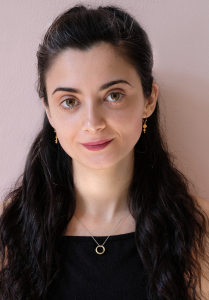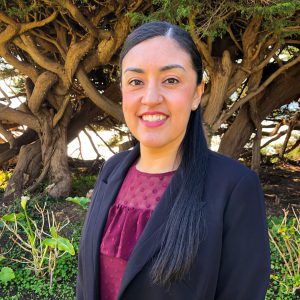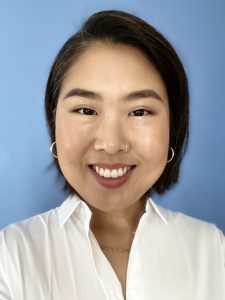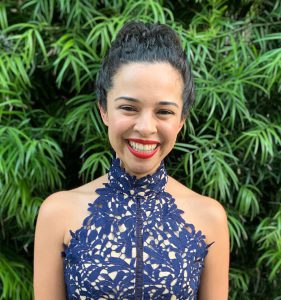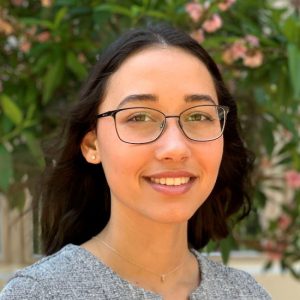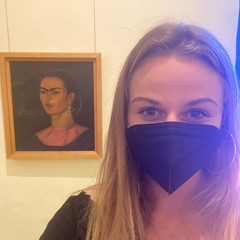Jonathan Savilla
Juris Doctor | M.A. German 2011 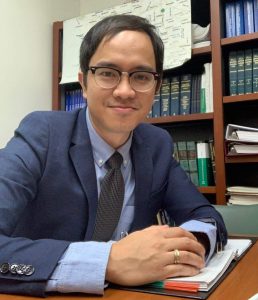
Criminal Prosecutor
Instructor of German
Postgraduate Study and Related Experiences:
After receiving my M.A. in German at CSULB where I also studied French, Russian, and Latin, I taught German at various institutions throughout Southern California, including the Beverly Hills Lingual Institute, Loyola Marymount University, Los Angeles Valley College, and Cerritos College. Additionally, I had the opportunity to work as a visiting English teacher at two Catholic secondary schools in Salzburg, Austria. Shortly after returning from Austria, I was awarded a scholarship to study law at Southwestern Law School in Los Angeles, while I continued to teach evening German classes at Cerritos College. In law school, I specialized in criminal law, trial advocacy, and appellate advocacy. I also interned at different branches of the Los Angeles County District Attorney’s Office, specifically the Torrance Victim Impact Unit, the Long Beach Juvenile Department, and the Preliminary Hearing Unit at the Clara Foltz Criminal Justice Center, where I represented the State of California at preliminary hearings involving serious felonies. After passing the California Bar Exam in 2022, I also sat for the Nevada Bar exam, and expect to continue my work in criminal prosecution, while continuing to teach online German classes in Southern California.
How did your studies in language and culture prepare you for your current job?
The study of language and culture have been invaluable in my career as a language instructor and as a lawyer. Studying new languages helped me develop strong communication skills, essential in both teaching and in law. Strong communication is critical in helping students learn a new language as well as in presenting a clear and persuasive legal argument. Moreover, the coursework I did in the German M.A. program at CSULB required me to research, read, analyze, and interpret complex literary texts and present my work before an audience of literary scholars. Through this process, I acquired essential critical thinking and analytical skills that I brought with me to the legal world, where lawyers are required to conduct extensive legal research, read and analyze complex legal texts, and develop persuasive arguments based on the findings.
Do you have any advice for students considering language and culture study?
Learning a new language may seem like a daunting and uncomfortable experience at first, but the benefits you can attain make the effort worthwhile. It takes time, practice, and persistence to develop proficiency in a new language, and like any other skill, mistakes are an inevitable part of the process. But the more you acknowledge and learn from your mistakes, the easier the effort becomes. It may take time, but progress will come with enough persistence, even if you don’t see it immediately. Learning a new language isn’t just about sitting in a classroom and memorizing words and writing conjugation tables. It’s about seeing the world from entirely new perspectives. By studying a new language, you can gain a deeper understanding of the cultures, customs, and traditions of people from all over the world. In doing so, you may even acquire a better understanding of your own culture from a fresh, new perspective. By learning a new language, you can connect with new people, travel to new places, and find opportunities that may not otherwise have been available to you. So step out of your comfort zone, learn a new language, and discover a new world waiting right outside your doorstep.
Robert Smith
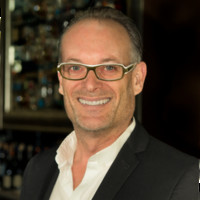 B.A. German 1993 | B.A. Chemistry 1993
B.A. German 1993 | B.A. Chemistry 1993
Study Abroad 1987-1988: Germany, Heidelberg University
Restaurant Owner
MARLENA LONG BEACH
How did your studies in language and culture prepare you for your current job?
Although I started out at CSULB studying Chemistry on a determined path to study medicine, the requirement of the chemistry department to have reading knowledge of German (one semester) exposed me to a passion for language, culture, travel and food that I had not yet discovered. My first year German professor, Wilm Pelters, inspired me as a freshman when he said, “if you really want to learn German, you must go there.” I continued studying German for two years and applied for the university’s exchange program in Heidelberg my junior year. I elected to pursue a double major in both Chemistry and German when I returned from studying abroad. To obtain a German degree, I was required to study two years of another language, so I elected to study Spanish one year at CSULB and I completed the second year requirement by studying abroad in Malaga, Spain at an intensive language institute, Málaca Instituto. The year I studied abroad Germany, 1987/1988, the Berlin wall was still standing and we were allowed to travel through communist East Germany on a special visa. We never imagined that Germany would be reunited a year later.
After graduating, I moved to England where I have family and found a job exporting computer hardware to Germany and other European countries. During this time, I discovered my passion for food and food-service and decided after four years to change careers. I have found that both the language and science studies I began at CSULB ignited a passion to continue learning. Being in the Italian restaurant business, I find myself frequently in Italy for food and wine-related visits and wanting to learn more Italian in order to become conversationally proficient.
Do you have any advice for students considering language and culture study?
Without wanting to be excessively wordy, I have to mention my friend and mentor, Dr. Ken Marsi, who was the Chemistry Department Chairman during my years of study. I approached Dr. Marsi for advice when I was failing inorganic chemistry. We really hit it off despite my struggles as a student and over time Dr. Marsi got me chemistry-related jobs at Honda Motors, Baxter Biotech, and LaserTech, a manufacturer of FTIR equipment. If I could go back and advise any student entering CSULB, I would say get to know your professors and department leaders. University study is forty percent about direct learning of information and sixty percent about developing an open mind and forming relationships that will help to enrich and expand your mind.
Alexandra Petrus
M.A. Game Development and Research (Cologne Game Lab in Cologen, Germany) 2021 | B.A. German & Film and Electronic Arts (CSULB) 2017
Alexandra Petrus earned her BA in Film and Electronic Arts (Directing) and German from California State University Long Beach in 2017, during which time she wrote and directed the award-winning narrative short film, Mourning Dove, which portrays the inner turmoil of a young refugee trying to comprehend her past. Petrus then received her MA in Game Development and Research at the Cologne Game Lab in Cologne, Germany, during which time she co-founded Achtung Autobahn Studios, a games studio currently developing the action-adventure game Maniacs, which procedurally and narratively explores the escalation of violence that occurred during the 1968 student protest movements in West Germany. After completing her MA, she worked as the Graduate Program Manager at the Cologne Game Lab, leading seminars in Media Studies. This Fall, she will begin her PhD in Cinema and Media Studies on full scholarship at the University of Southern California, where she plans to research the relationship between historical media and cultural memory.
Carlos Mayerstein
M.A. Spanish 2019 – California State University Long Beach | B.A. International Relations – Universidad de las Américas Puebla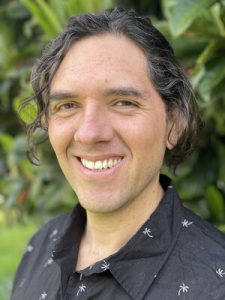
Study Abroad: Rio de Janeiro
One on One Spanish Instructor
CSULB LANGUAGE TRAINING CENTER INITIATIVE
How did your studies in language and culture prepare you for your current job?
I teach one-on-one Spanish online for CSULB Language Training Center Initiative and a Spanish School in Marin County. Both of my jobs require me to teach the language using authentic and culturally relevant materials from the Spanish-speaking world. Due to my academic background and experience in language and culture, I can easily create personalized lessons for each of my students, and to engage with them in fruitful conversations on topics ranging from history, literature, politics, economics, technology, and media to current social and cultural events taking place in Latin America, the United States, and the Spanish peninsula.
Do you have any advice for students considering language and culture study?
Besides acquiring fluency in another language, studying culture and language not only will make you more conscious of your surroundings and aware of other cultures, but you can also apply that knowledge to different professional areas besides language teaching such as translation and localization for tech and media companies, government jobs, or advertising. Take advantage of the opportunities offered during the language program and get involved in extracurricular activities as much as possible. You will find these experiences useful in the future as a professional.
Sara Sanchez
BA in Communication Studies and Spanish – California State University Long Beach
MA in Educational Administration – Student Affairs -University of Nebraska – Lincoln
How did your experience in the Spanish program at CSULB prepare you for your current career?
I credit my experience as a student in the Spanish program at CSULB with providing me with a “sense of belonging” during my college experience. This sense of belonging meant feeling part of a community among my classmates and my professors. My Spanish professors (Drs. Claire Martin, Lisa Vollendorf, and Leslie Nord, to name a few) are those that I considered mentors then and now. I have turned to them for everything from letters of recommendations to advice on job interviews. The experiences of camaraderie and support as a student in the Spanish program are part of what give me a point of reference for the “sense of belonging work” that I have been a part of with the Hispanic Serving Institution (HSI) Initiatives at UC Santa Cruz and now most recently as the Director of the GANAS Graduate Pathways grant.
Joyhanna Yoo Garza
Ph.D. Linguistics (UC Santa Barbara) 2021 | M.A. Spanish Languages & Culture (CSULB) 2015 | B.A. Political Science (UCLA) with a double minor in Latin American Studies and Spanish
College Fellow in Linguistic/Semiotic Anthropology
Department of Anthropology, Harvard University
How did your studies in language and culture prepare you for your current job?
The training I received in the Spanish M.A. program at CSULB exposed me to crucial theories which helped me to think expansively about the way language functions when I entered a Ph.D. program in linguistics. I initially joined the program wanting to become a Spanish instructor at the college level (and I was definitely well-positioned to do so after graduating!), but my love of literary criticism and interest in the social life of language inspired me to pursue a Ph.D. after graduating from the program.
Beyond the incredibly rich content I acquired in this program, what lingers in my memory are the relationships which shaped me, including the caring professors who mentored me. This program has professionalization built into its structure, and I had numerous opportunities to better my teaching, interact with professors outside of my immediate program, and to present my work at academic conferences.
Do you have any advice for students considering language and culture study?
This program doesn’t just expose you to new information. The discussions you’ll have in classes and the readings you encounter will fundamentally change the way that you think. It will help you to think comparatively and historically; in short, it will help you think more expansively.
Leslie Davila
PhD Hispanic Literatures: Central American Art and Literature Related to Violence Against Women 2019 | M.A. Spanish Literature and Culture 2012 | B.A. Spanish and Latin American Studies 2007
Mellon / American Council of Learned Societies Fellow
COMMUNITY COLLEGE PROFESSOR
As a Guatemalan-American I quickly realized that in academia Central American writers and artists were often excluded from the classroom space and curriculum. This led me to study a Master’s at CSULB and later a Ph.D. in Hispanic Languages & Literatures at the University of Pittsburgh. Today, I am a professor at Community Colleges and enthusiastically expose students to contemporary, and often non-canonical, writers and artists from Guatemala and Central America. My intention is for students to feel seen in my classroom and appreciate the diversity in Latin American literature. Although the journey to get to where I am was a long one, it was my passion for literature that kept me determined and inspired. My advice to future students is to find out what inspires you, plan where you want to take this inspiration and connect with your “why” along the way. We all have something to offer and only you can bring that to the table.
Margaux Stancil
B.A. French & Francophone Studies, Minor Spanish, 2019
Study Abroad: MICEFA/ CSUIP al la Sorbonne Nouvelle 2017-2018
Social Media Marketing Manager
ALLIANCE FRANCAISE SILICON VALLEY
Postgraduate Studies and Related Experiences:
The French American Fund program with the Naomi Gonzalez scholarship for an internship at the French senate, along with 1 semester of studies (fall 2019) at Sorbonne Pantheon studying Political Science of the European Union.
How did your studies in language and culture prepare you for your current job?
My studies in the French language and culture helped prepare me for my current and previous jobs by not only providing essential skills and a new perspective on life but also the ability to excel in a multilingual work environment and achieve my goal of working abroad.
While looking for jobs, I quickly found that the skills I learned were in high demand, and they helped me get positions that I wouldn’t have been able to get if I hadn’t studied what I did. It also allowed me to learn much more than just French, but translation, writing, community organization, public speaking, and much more.
While studying, I also was able to study abroad, which significantly changed my life and brought endless positive factors to my career path. I have over 5 years of international marketing experience and am currently the marketing executive at a French Blockchain company. I would have never been able to get where I am today without having gone through the French program and learned what I did!
Do you have any advice for students considering language and culture study?
Sometimes the path to your goals isn’t always clear or direct. I never would have thought studying French would allow me to land a dream job in marketing in Paris, you can never know! You can only go with your gut and follow what interests you the most.
To Learn More About My experience with the French American Fund Click HERE!
Jodie Sullivan
B.A. Spanish 2019 | Single Subject Teaching Credential
Study Abroad: Santander Spain
High School Spanish Instructor
East Los Angeles
How did your studies in language and culture prepare you for your current job?
My study in languages prepared me to instruct a diverse group of students. It taught me how to appreciate and value different perspectives and cultures. Not only did the program teach me about the “mechanics” of Spanish (grammar, syntax etc.), what I am most grateful for is how it taught me how to analyze situations. It is one thing to know how to read/ write correctly, however, it is much more beneficial to learn how to analyze texts and situations. This is a skill I use all the time when I am teaching and a skill I try to instill in my students. This leads to critical thinkers which are a necessity in today’s world. Instead of just teaching what the “problem” is, they teach you why the problem became a problem in the first place. The Spanish program at CSULB does not just teach you the “how to” but they also teach you the “why.” Many classes I took delved into much deeper issues that explained why things are the way they are today and how history has impacted those issues. The program did an excellent job on connecting the past to our present. As a high school teacher, it is my job to prepare students for life after high school, whether that be college or the work force, therefore it is my job to teach them these invaluable skills to become successful critical thinkers.
Do you have any advice for students considering language and culture study?
Do it because it is so worth it. This kind of study makes you think in ways that you may never have thought in before. Ask for help when you need it because there are so many resources and wonderful professors available for you. By studying language and culture, you also study history, linguistics, literature and so much more. You really do learn so much about the world and how it is all connected.
James Allen
B.A. International Studies 2017 | B.A. French & Francophone Studies (Interdisciplinary Option) 2017
Study Abroad: CSUIP Paris, University de Paris VIII
Operations and Projects Coordinator
COLUMBIA UNIVERSITY INSTITUTE FOR IDEAS AND IMAGINATION IN PARIS
Postgraduate and Related Experiences:
Just after graduation, I taught English at the Université de Rouen (2017-2018). After this, I became the first recipient of the Nohemi Gonzalez Palais Bourbon Fellowship (2018-2019). CSULB student Nohemi Gonzalez tragically lost her life during the November attacks in 2015 and this opportunity was created in memory of her. This fellowship, which included an internship at the French parliament alongside classes at the Sorbonne, was an honor and privilege to be a part of. It also opened the door to my next pursuit: an internship in Washington D.C. with the Center for International Policy (Jan-May 2019). Here, I did research on the foreign funding of think tanks and published editorials in major publications. All of these experiences led to my current job as Operations & Projects Coordinator at Columbia University’s Institute for Ideas and Imagination in Paris. The Institute invites Columbia professors and artists and writers from around the world for a year-long residency that aims to topple the barriers between the arts and academia. My main roles are organizing our public events (screenings, concerts, art shows, conferences, etc.), managing our partnership with Columbia University Libraries, and helping residents access research resources in Paris.
How did your studies in language and culture prepare you for your current job?
Studying French language and civilization prepared me for my current role in Paris. On a practical level, I am able to communicate in an academic and professional context in French, which has been essential for working with institutional partners, vendors, and research hubs in Paris. On an intellectual level, my knowledge of France (cinema, literature, history, etc.) has allowed me to connect and engage with the artists, writers, and scholars with whom I work. Pairing my degree in French with one in International Studies provided an extra layer of preparation for working in a global environment with thinkers and creatives from around the world.
Do you have any advice for students considering language and culture study?
First, I’d like to say: don’t let financial barriers stop you from trying to access study abroad, or other international opportunities for culture and language study. There are scholarships and funding available (both from CSULB and from external organizations), and I was fortunate enough to have faculty who introduced me to these possibilities. Funds are available, so don’t be afraid to make an appointment with the Scholarship Office or with RGRLL faculty. Second: culture and language study graduates are candidates for wide-ranging and exciting jobs. Be open and creative when considering your plans, as you may be surprised where you land (geographically and professionally). You can work in politics, culture, journalism, activism, academia and many other sectors. I’ve found that my French degree has been a conversation starter with employers and has made me stand out from other candidates who’ve studied subjects that one may see more often (communications, business, psychology, etc.).

